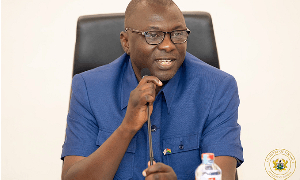The government says it has taken bold steps to reduce, if not eliminate, the continuous support to the Electricity Company of Ghana (ECG) in financing the country’s energy sector shortfalls.
That action by the government, Dr. Amin Adam said was to make ECG cost and operationally efficient, thereby, reducing the emergency liabilities the company imposed on the Ministry of Finance.
He was responding to a question asked by the Ghana News Agency at a press briefing at the just-ended International Monetary Fund (IMF)/World Bank Group (WBG) Annual Meetings in Washington DC (USA).
In 2024 alone, the government has committed approximately, GHS18 billion (US$1.2bn) in financing energy sector shortfalls, to enable ECG to pay Independent Power Producers (IPPs), and other value chain players.
The other sector players include the Volta River Authority (VRA), Bui Power Authority (BPI), Ghana National Gas Company, Ghana Grid Company (GRIDCo), and ECG itself.
The shortfall, attributed to losses, created by people consuming and not paying bills, inefficiencies in metering and billing systems and other operational challenges, led to ECG’s inability to pay value chain players as due them.
However, Dr. Amin Adam has indicated that the situation, which the African Centre for Energy Policy (ACEP) has described as “unsustainable” would be reduced drastically, through sector-collaborative initiatives.
“This is a matter that we can no longer leave for the energy sector players alone. This is why the Finance Ministry has taken interest in negotiating measures that we need to implement,” he said.
“We’re working closely with the Ministry of Energy to ensure that these measures are implemented in order for ECG to collect more to pay everybody, and then the burden on the budget of having to pay for the shortfall is minimised or eliminated,” Dr. Amin Adam said.
The interventions include the recent US$260 million deal with the World Bank for the procurement of about one million smart metres to reach more customers, and their integration to ensure enhanced revenue collection.
Also, there would be an effective and transparent implementation of the Cash Waterfall Mechanism, and a sector-wide audit to correct the challenges in the entire energy sector, the Finance Minister said.
He stated that the savings from the interventions to reduce the government’s commitment to ECG’s shortfall would be “repurposed to critical areas of education, health, and road infrastructure.”
“If they [ECG] were to be efficient in collecting more, if those who steal power were to be paying for the power, then they will be able to collect more to pay all those in the value chain, what is due them,” he echoed.
In an exclusive interview with GNA on the margins of the IMF/WBG Annual Meetings, Ben Boakye, Executive Director, ACEP, called for a bi-partisan-multi stakeholder approach to ending the challenges in the energy sector, particularly ECG’s inefficiencies.
“Currently, ECG is pilling more than 50 per cent of its revenue as debt. So, there’s significant under-recoveries in the sector, which undermines Ghana’s budget because the government guarantees a lot of the power plants,” he said.
He asked the government to involve the private sector, including bringing on board, the second-tier Pensions Fund managers, whom he said could raise enough funds to invest and ensure better returns to pay value chain players.
“We must agree that enough of the politics; let’s treat ECG has a business, bringing the private sector to run it, who will put in their money, and also make sure that they’re able to pay the bills,” he said.
Watch the latest edition of BizHeadlines below:
Click here to follow the GhanaWeb Business WhatsApp channel
Watch the latest episode of Health Focus below:
Business News of Monday, 28 October 2024
Source: GNA

















